Charles E W Bean, Diaries, AWM38 3DRL 606/248/1 - 1917 - 1931 - Part 2
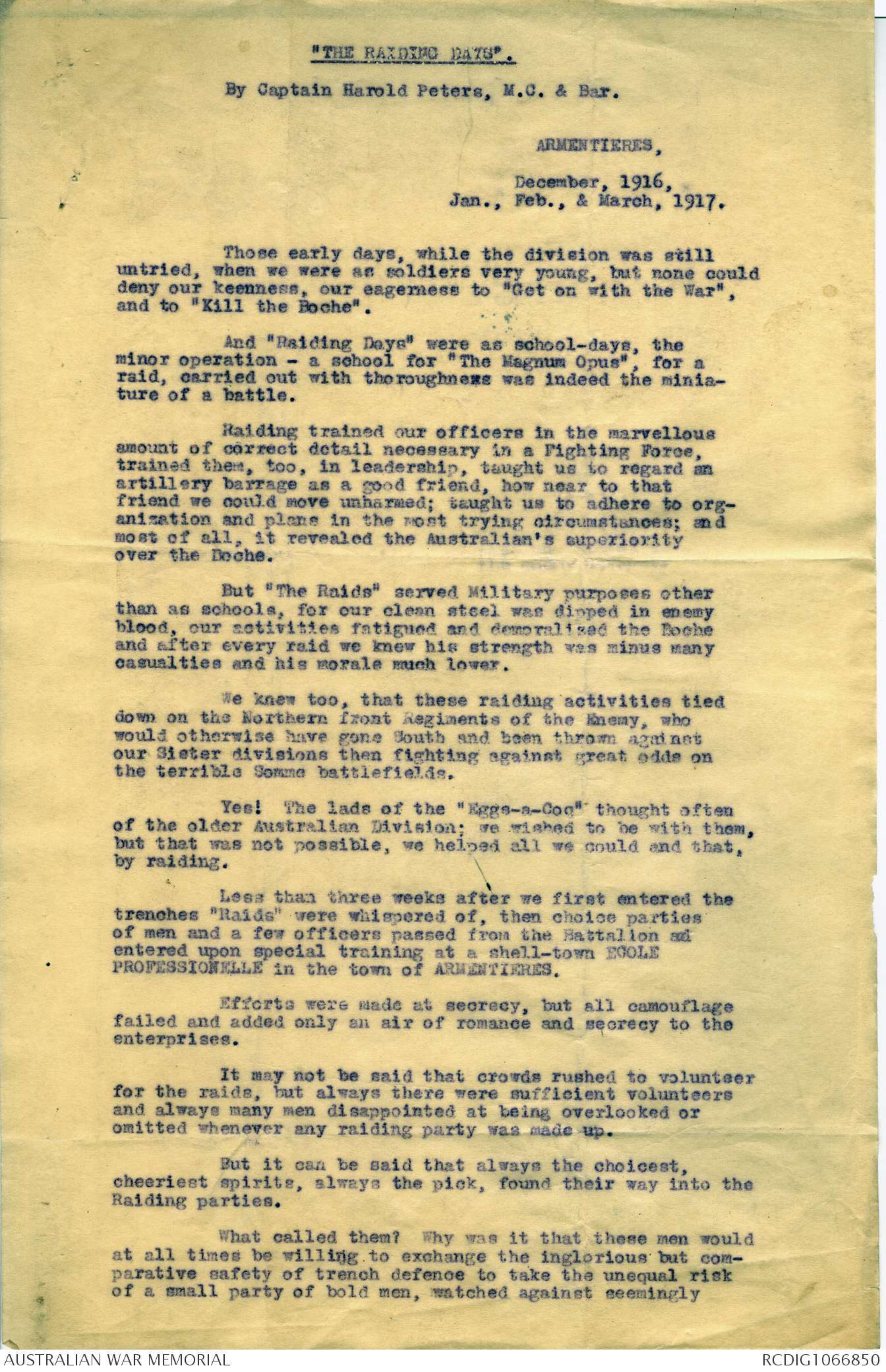
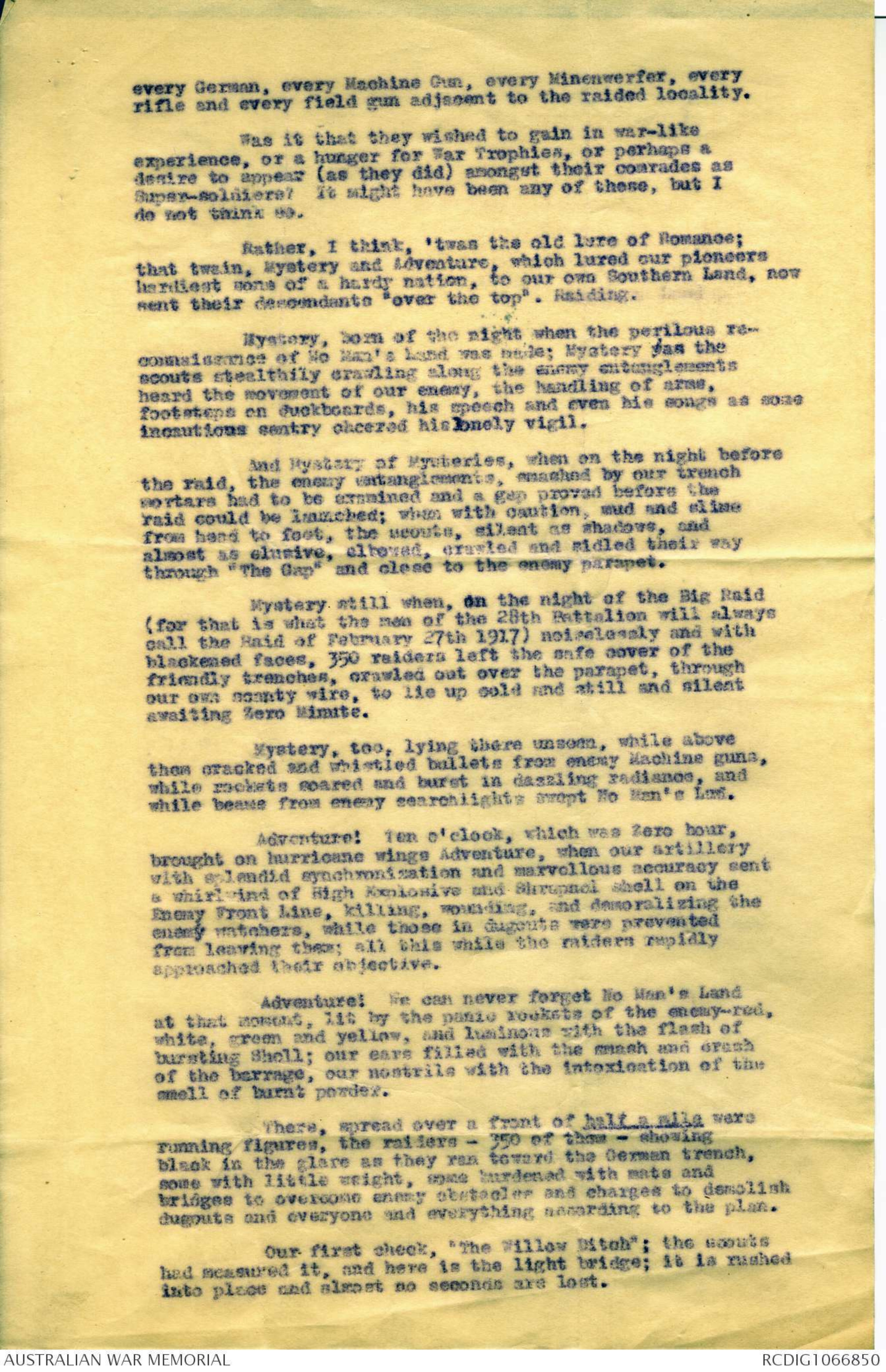
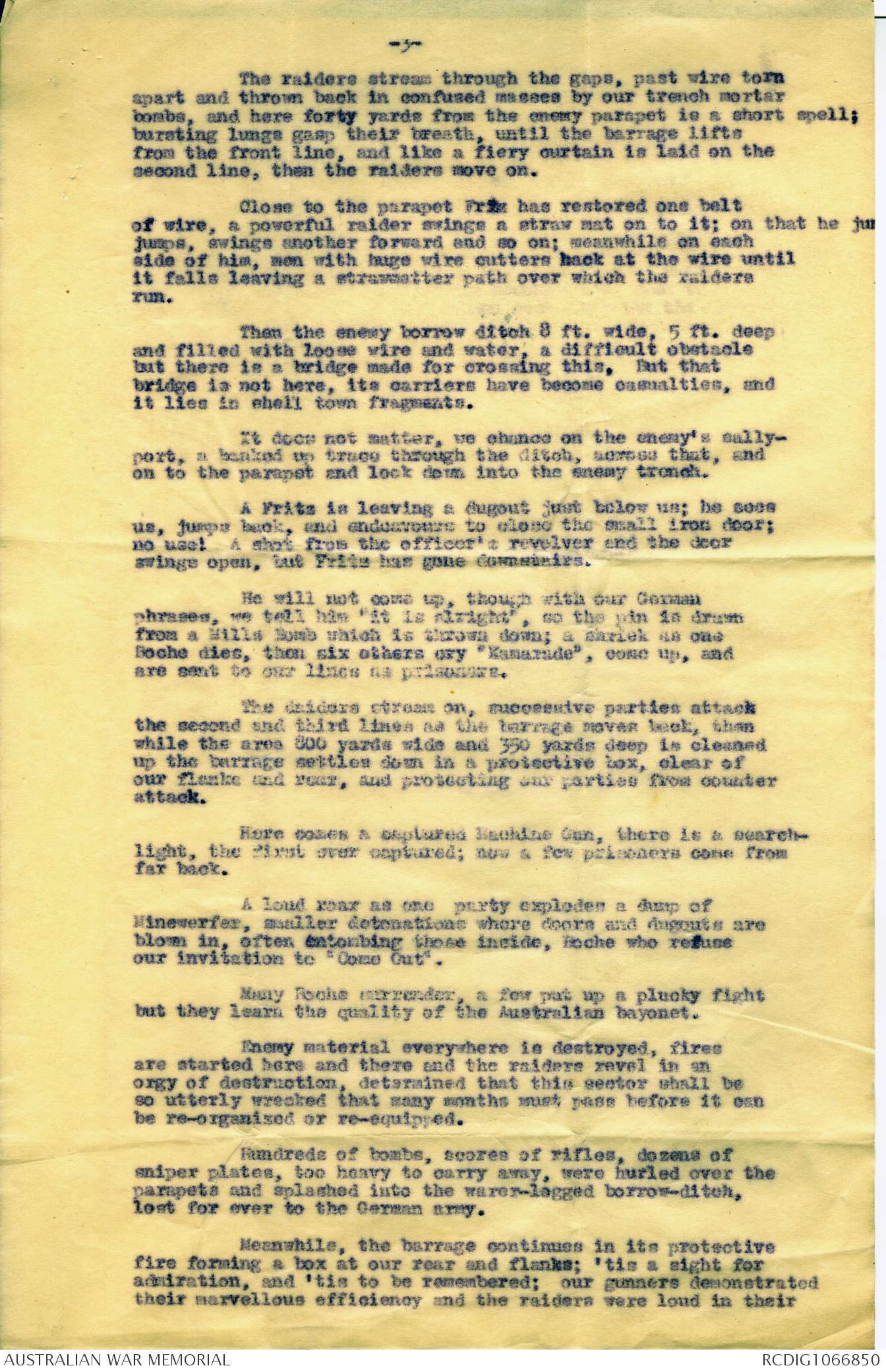
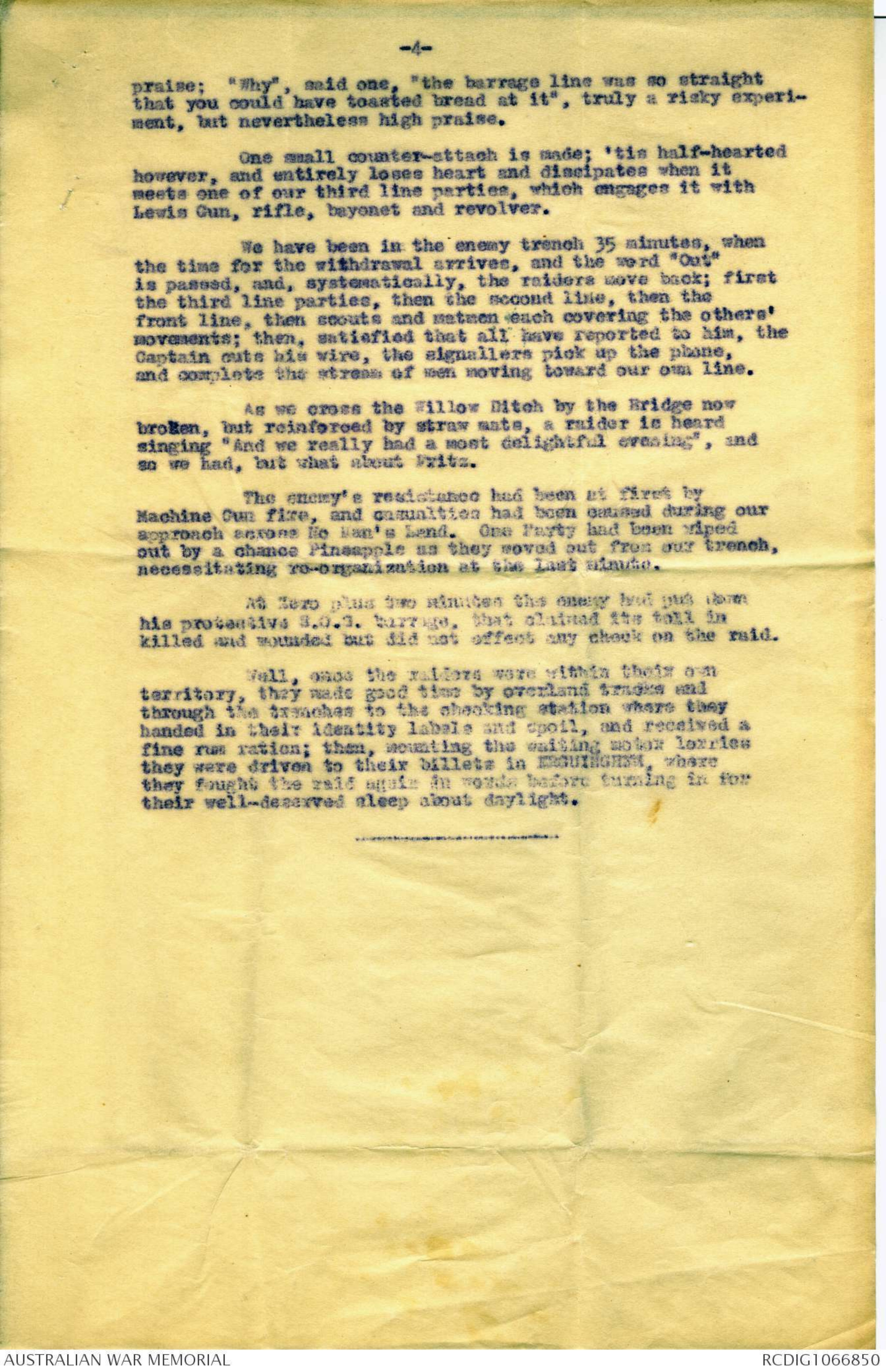
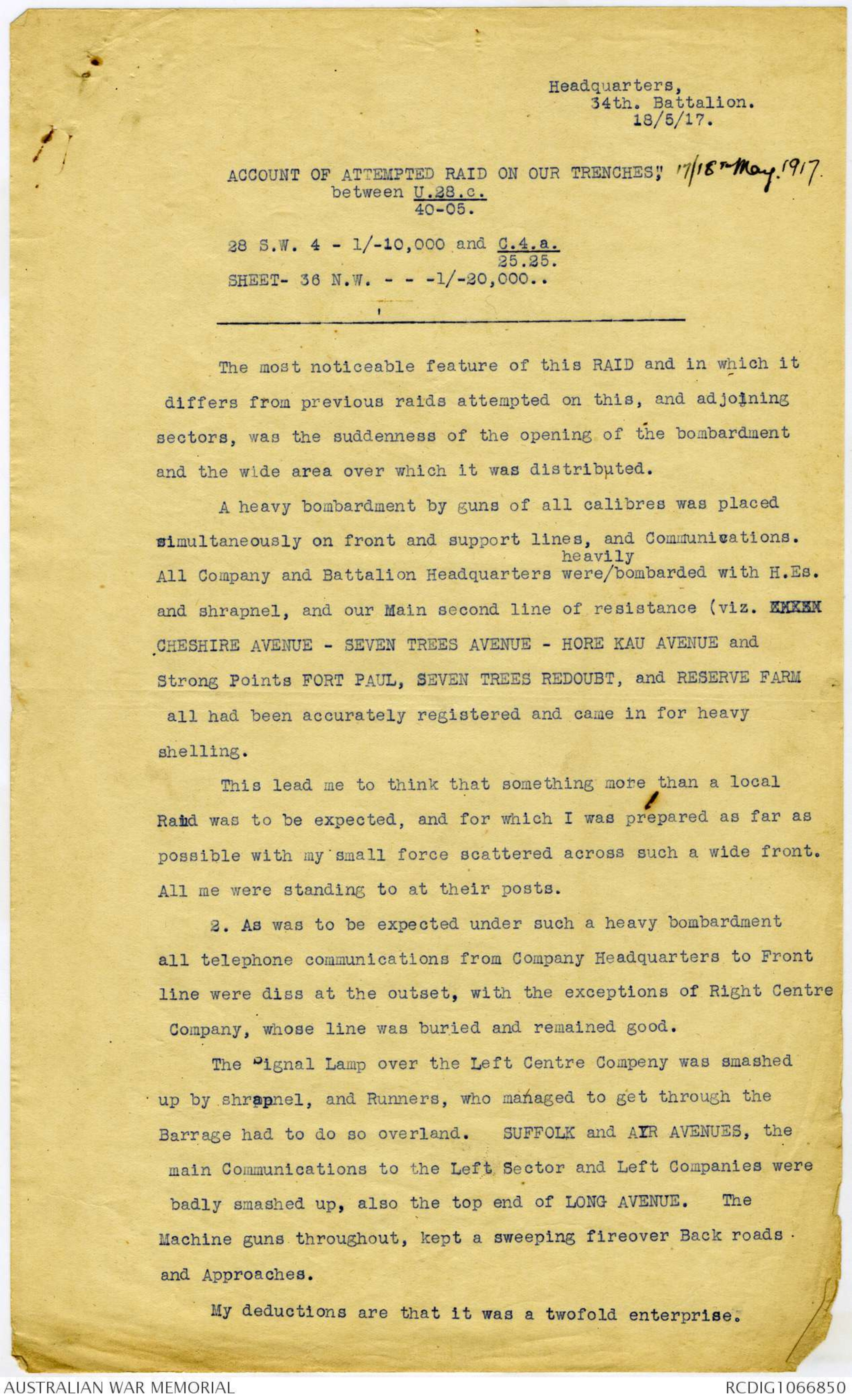
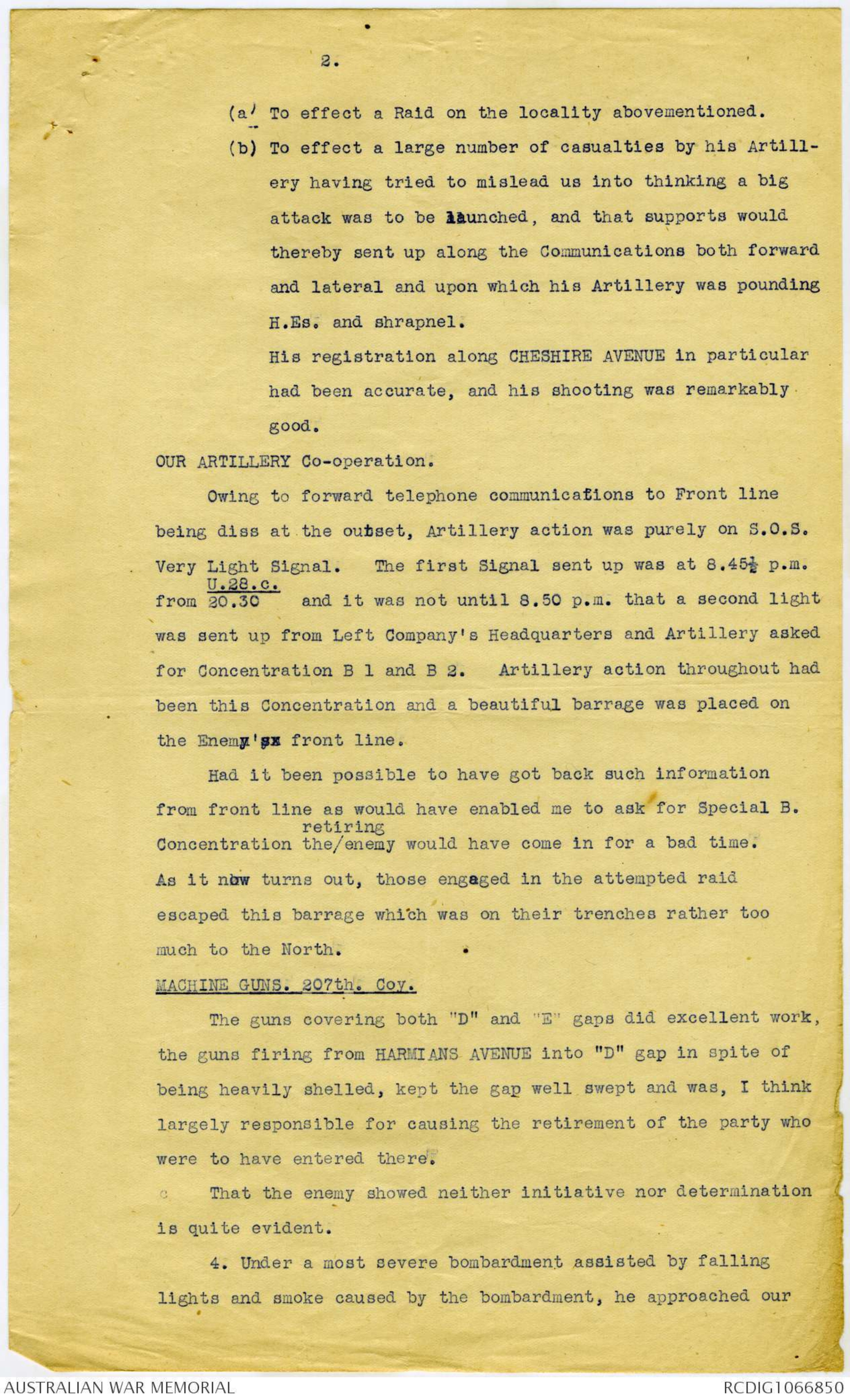
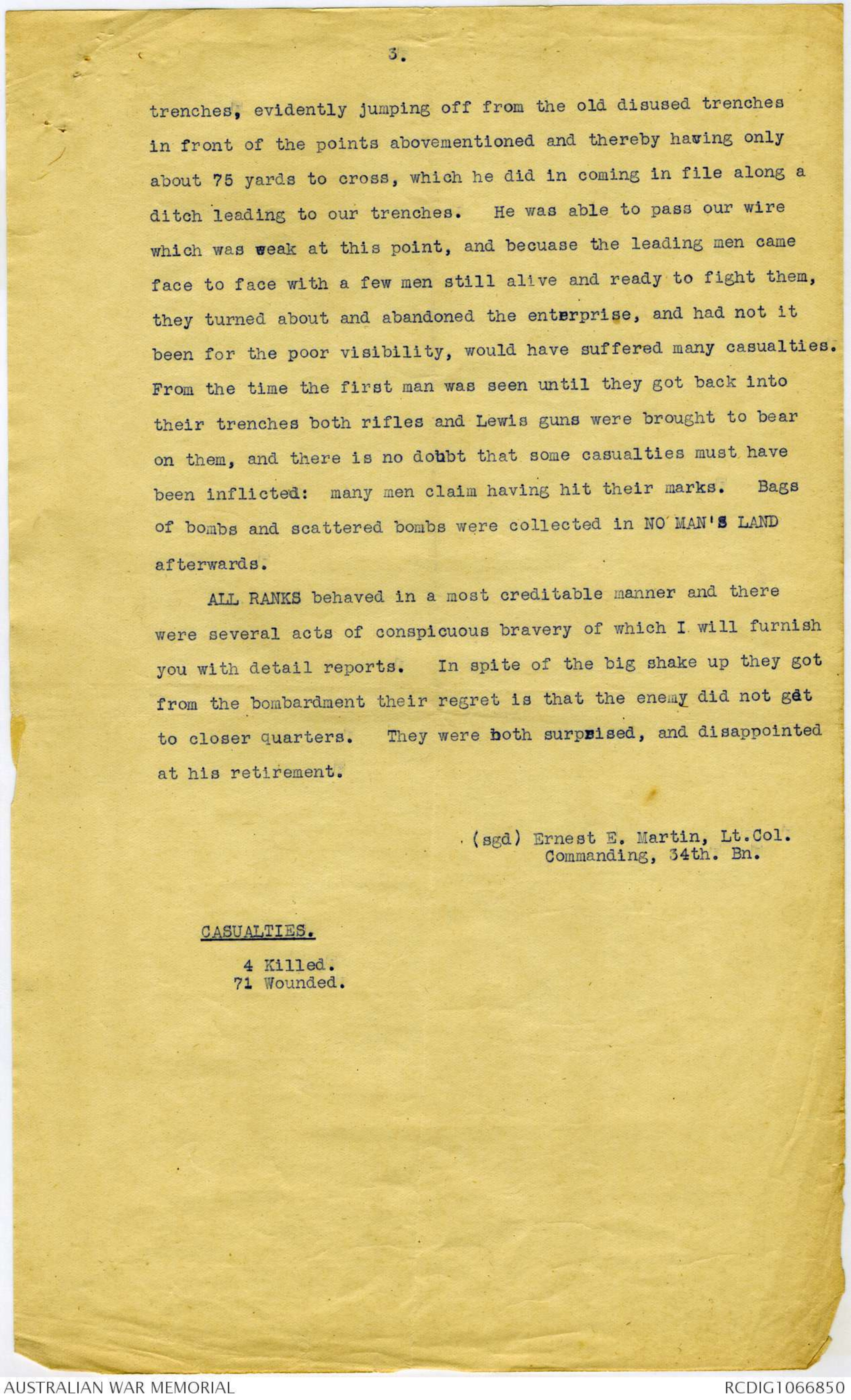
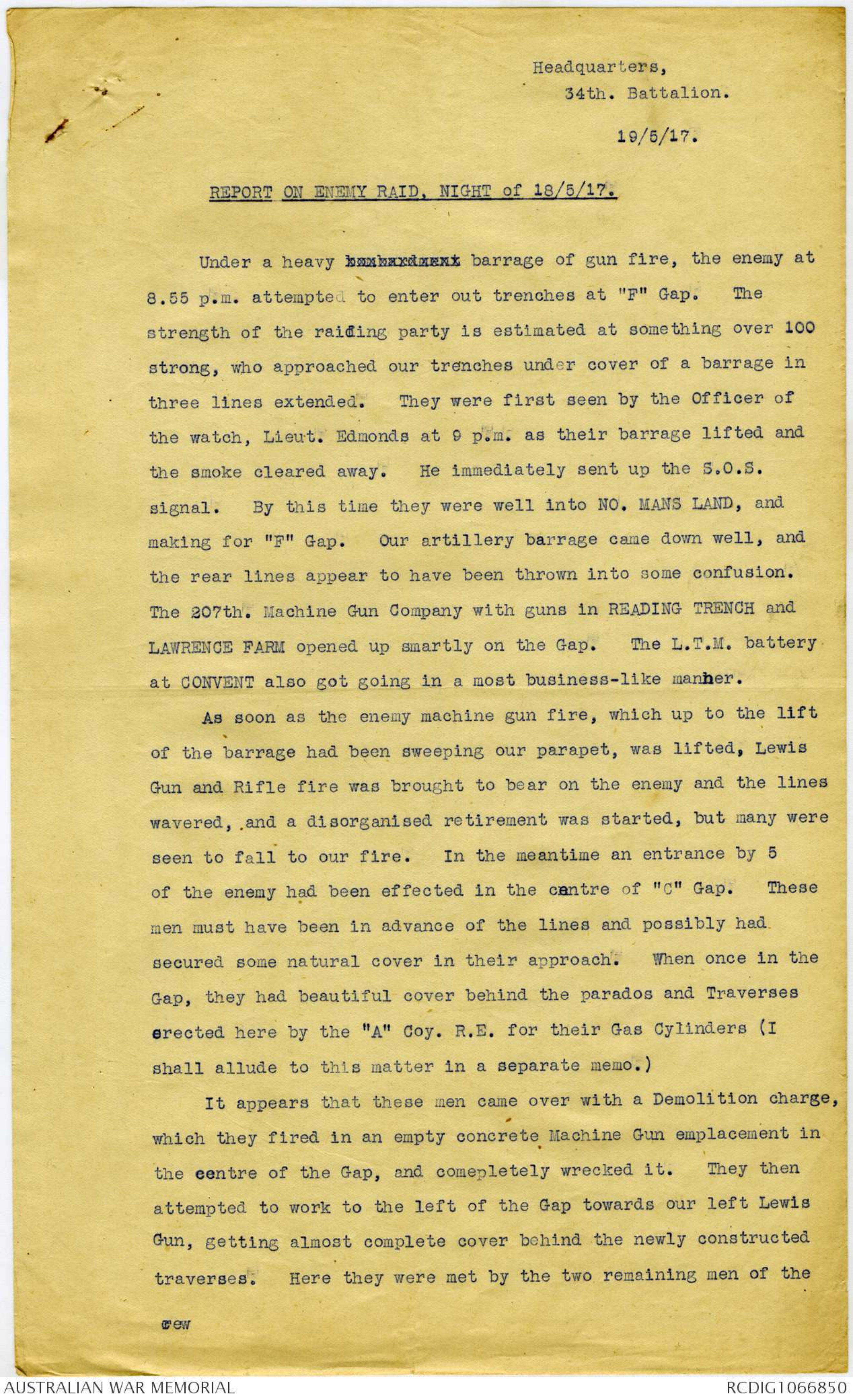
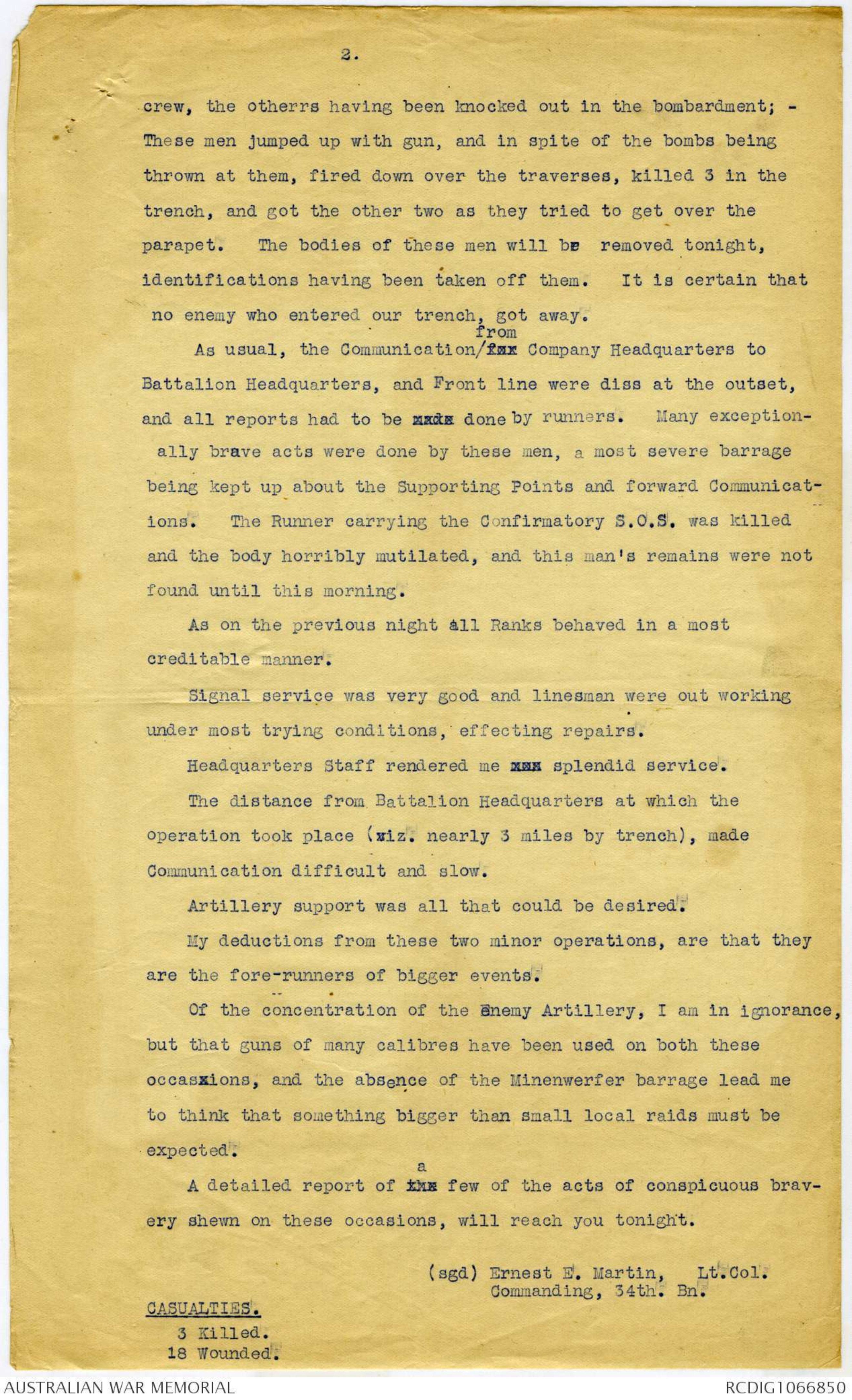
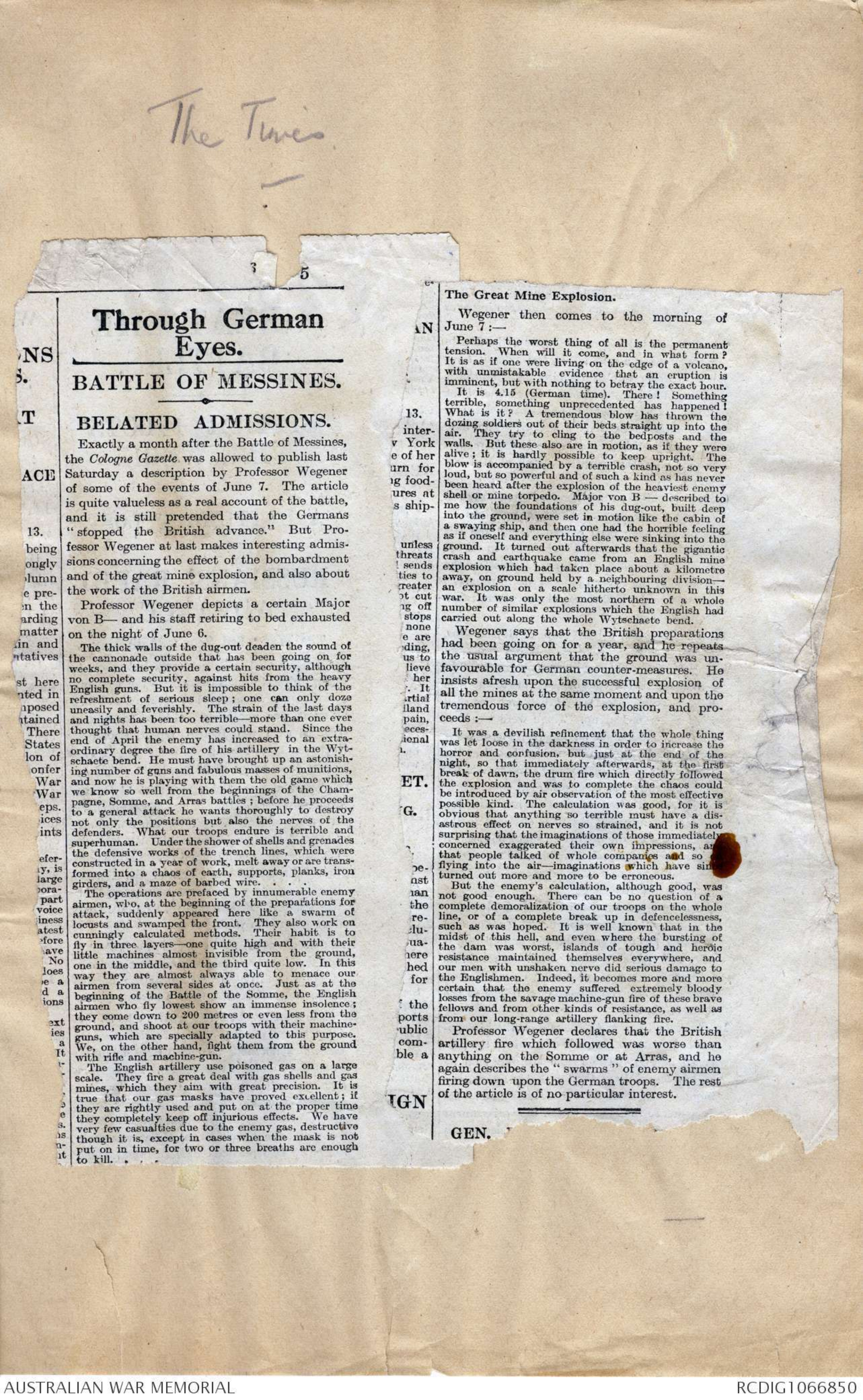
"THE RAIDING DAYS".
By Captain Harold Peters, M.C. & Bar.
ARMENTIERES,
December, 1916,
Jan., Feb., & March, 1917.
Those early days, while the division was still
untried, when we were as soldiers very young, but none could
deny our keenness, our eagerness to "Get on with the War",
and to "Kill the Boche".
And "Raiding Days" were as school-days, the
minor operation - a school for "The Magnum Opus", for a
raid, carried out with thoroughness was indeed the miniature
of a battle.
Raiding trained our officers in the marvellous
amount of correct detail necessary in a Fighting Force,
trained them, too, in leadership, taught us to regard an
artillery barrage as a good friend, how near to that
friend we could move unharmed; taught us to adhere to organization
and plans in the most trying circumstances; and
most of all, it revealed the Australian's superiority
over the Boche.
But "The Raids" served Military purposes other
than as schools, for our clean steel was dipped in enemy
blood, our activities fatigued and demoralized the Boch
and after every raid we knew his strength was minus many
casualties and his morale much lower.
We knew too, that these raiding activities tied
down on the Northern front Regiments of the Enemy, who
would otherwise have gone South and been thrown against
our Sister divisions then fighting against great odds on
the terrible Somme battlefields.
Yes! The lads of the "Eggs-a-Coq" thought often
of the older Australian Division; we wished to be with them,
but that was not possible, we helped all we could and that,
by raiding.
Less than three weeks after we first entered the
trenches "Raids" were whispered of, then choice parties
of men and a few officers passed from the Battalion and
entered upon special training at a shell-town ECOLE
PROFESSIONELLE in the town of ARMENTIERES.
Efforts were made at secrecy, but all camouflage
failed and added only an air of romance and secrecy to the
enterprises.
It may not be said that crowds rushed to volunteer
for the raids, but always there were sufficient volunteers
and always many men disappointed at being overlooked or
omitted whenever any raiding party was made up.
But it can be said that always the choicest,
cheeriest spirits, always the pick, found their way into the
Raiding parties.
What called them? Why was it that these men would
at all times be willing to exchange the inglorious but comparative
safety of trench defence to take the unequal risk
of a small party of bold men, matched against seemingly
every German, every Machine Gun, every Minenwerfer, every
rifle and every field gun adjacent to the raided locality.
Was it that they wished to gain in war-like
experience, or a hunger for War Trophies, or perhaps a
desire to appear (as they did) amongst their comrades as
Super-soldiers? It might have been any of these, but I
do not think so.
Rather, I think, 'twas the old lure of Romance;
that twain, Mystery and Adventure, which lured our pioneers
hardiest sons of a hardy nation, to our own Southern Land, now
sent their descendants "over the top". Raiding.
Mystery, born of the night when the perilous reconnaissance
of No Man's Land was made; Mystery was the
scouts stealthily crawling along the enemy entanglements
heard the movement of our enemy, the handling of arms,
footsteps on duckboards, his speech and even his songs as some
incautious sentry cheered his lonely vigil.
And Mystery of Mysteries, when on the night before
the raid, the enemy entanglements, smashed by our trench
mortars had to be examined and a gap proved before the
raid could be launched; when with caution, mud and slime
from head to foot, the scouts, silent as shadows, and
almost as elusive, elbowed, crawled and sidled their way
through "The Gap" and close to the enemy parapet.
Mystery still when, on the night of the Big Raid
(for that is what the men of the 28th Battalion will always
call the Raid of February 27th 1917) noiselessly and with
blackened faces, 350 raiders left the safe cover of the
friendly trenches, crawled out over the parapet, through
our own scanty wire, to lie up cold and still and silent
awaiting Zero Minute.
Mystery, too, lying there unseen, while above
them cracked and whistled bullets from enemy Machine guns,
while rockets soared and burst in dazzling radiance, and
while beams from enemy searchlights swept No Man's Land.
Adventure! Ten o'clock, which was Zero hour,
brought on hurricane wings Adventure, when our artillery
with splendid synchronization and marvellous accuracy sent
a whirlwind of High Explosive and Shrapnel shell on the
Enemy Front Line, killing, wounding, and demoralizing the
enemy watchers, while those in dugouts were prevented
from leaving them; all this while the raiders rapidly
approached their objective.
Adventure! We can never forget No Man's Land
at that moment, lit by the panic rockets of the enemy-red,
white, green and yellow, and luminous with the flash of
bursting Shell; our ears filled with the smash and crash
of the barrage, our nostrils with the intoxication of the
smell of burnt powder.
There, spread over a front of half a mile were
running figures, the raiders - 350 of them - showing
black in the glare as they ran toward the German trench,
some with little weight, some burdened with mats and
bridges to overcome enemy obstacles and charges to demolish
dugouts and everyone and everything according to the plan.
Our first check, "The Willow Ditch"; the scouts
had measured it, and here is the light bridge; it is rushed
into place and almost no seconds are lost.
-3-
The raiders stream through the gaps, past wire torn
apart and thrown back in confused masses by our trench mortar
bombs, and here forty yards from the enemy parapet is a short spell;
bursting lungs gasp their breath, until the barrage lifts
from the front line, and like a fiery curtain is laid on the
second line, then the raiders move on.
Close to the parapet Fritz has restored one belt
of wire, a powerful raider swings a straw mat on to it; on that he ju
jumps, swings another forward and so on; meanwhile on each
side of him, men with huge wire cutters hack at the wire until
it falls leaving a strawmatter path over which the raiders
run.
Then the enemy borrow ditch 8 ft. wide, 5 ft. deep
and filled with loose wire and water, a difficult obstacle
but there is a bridge made for crossing this. But that
bridge is not here, its carriers have become casualties, and
it lies in shell town fragments.
It does not matter, we chance on the enemy's sallyport,
a banked up trace through the ditch, across that, and
on to the parapet and lock down into the enemy trench.
A Fritz is leaving a dugout just below us; he sees
us, jumps back, and endeavours to close the small iron door;
no use! A shot from the officer's revolver and the door
swings open, but Fritz has gone downstairs.
He will not come up, though with our German
phrases, we tell him "it is alright", so the pin is drawn
from a Mills Bomb which is thrown down; a shriek as one
Boche dies, then six others cry "Kamarade", come up, and
are sent to our lines as prisoners.
The daiders stream on, successive parties attack
the second and third lines as the barrage moves back, then
while the area 800 yards wide and 350 yards deep is cleaned
up the barrage settles down in a protective box, clear of
our flanks and rear, and protecting our parties from counter
attack.
Here comes a captured Machine Gun, there is a searchlight,
the first ever captured; now a few prisoners come from
far back.
A loud roar as one party explodes a dump of
Minewerfer, smaller detonations where doors and dugouts are
blown in, often entombing those inside, Boche who refuse
our invitation to "Come Out".
Many Boche surrender, a few pat up a plucky fight
but they learn the quality of the Australian bayonet.
Enemy material everywhere is destroyed, fires
are started here and there and the raiders revel in an
orgy of destruction, determined that this sector shall be
so utterly wrecked that many months must pass before it can
be re-organized or re-equipped.
Hundreds of bombs, scores of rifles, dozens of
sniper plates, too heavy to carry away, were hurled over the
parapets and splashed into the warer-logged borrow-ditch,
lost for ever to the German army.
Meanwhile, the barrage continues in its protective
fire forming a box at our rear and flanks; 'tis a sight for
admiration, and 'tis to be remembered; our gunners demonstrated
their marvellous efficiency and the raiders were loud in their
-4-
praise; "Why", said one, " the barrage line was so straight
that you could have toasted bread at it", truly a risky experiment,
but nevertheless high praise.
One small counter-attach is made; 'tis half-hearted
however, and entirely loses heart and dissipates when it
meets one of our third line parties, which engages it with
Lewis Gun, rifle, bayonet and revolver.
We have been in the enemy trench 35 minutes, when
the time for the withdrawal arrives, and the word "Out"
is passed, and, systematically, the raiders move back; first
the third line parties, then the second line, then the
front line, then scouts and matmen each covering the others'
movements; then, satisfied that all have reported to him, the
Captain cuts his wire, the signallers pick up the phone,
and complete the stream of men moving toward our own line.
As we cross the Willow Ditch by the Bridge now
broken, but reinforced by straw mats, a raider is heard
singing "And we really had a most delightful evening", and
so we had, but what about Fritz.
The enemy's resistance had been at first by
Machine Gun fire, and casualties had been caused during our
approach across No Man's Land. One Party had been wiped
out by a chance Pineapple as they moved out from our trench,
necessitating re-organization at the Last minute.
At Zero plus two minutes the enemy had put down
his protective S.O.S. barrage, that claimed its toll in
killed and wounded but did not effect any check on the raid.
Well, once the raiders were within their own
territory, they made good time by overland tracks and
through the trenches to the checking station where they
handed in their identity labels and spoil, and received a
fine rum ration; then, mounting the waiting motor lorries
they were driven to their billets in ERGUINGHEM, where
they fought the raid again in words before turning in for
their well-deserved sleep about daylight.
Headquarters,
34th. Battalion.
18/5/17.
ACCOUNT OF ATTEMPTED RAID ON OUR TRENCHES,"17/18th May. 1917
between U.28.c.
40-05.
28 S.W. 4 - 1/-10,000 and C.4.a.
25.25.
SHEET- 36 N.W. - - -1/-20,000..
The most noticeable feature of this RAID and in which it
differs from previous raids attempted on this, and adjoining
sectors, was the suddenness of the opening of the bombardment
and the wide area over which it was distributed.
A heavy bombardment by guns of all calibres was placed
simultaneously on front and support lines, and Communications.
All Company and Battalion Headquarters were ^heavily bombarded with H.Es.
and shrapnel, and our Main second line of resistance (viz. CHESH
CHESHIRE AVENUE - SEVEN TREES AVENUE - HORE KAU AVENUE and
Strong Points FORT PAUL, SEVEN TREES REDOUBT, and RESERVE FARM
all had been accurately registered and came in for heavy
shelling.
This lead me to think that something more than a local
Raid was to be expected, and for which I was prepared as far as
possible with my small force scattered across such a wide front.
All me were standing to at their posts.
2. As was to be expected under such a heavy bombardment
all telephone communications from Company Headquarters to Front
line were diss at the outset, with the exceptions of Right Centre
Company, whose line was buried and remained good.
The Signal Lamp over the Left Centre Compeny was smashed
up by shrapnel, and Runners, who managed to get through the
Barrage had to do so overland. SUFFOLK and AYR AVENUES, the
main Communications to the Left Sector and Left Companies were
badly smashed up, also the top end of LONG AVENUE. The
Machine guns throughout, kept a sweeping fireover Back roads
and Approaches.
My deductions are that it was a twofold enterprise.
2.
(a) To effect a Raid on the locality abovementioned.
(b) To effect a large number of casualties by his Artillery
having tried to mislead us into thinking a big
attack was to be launched, and that supports would
thereby sent up along the Communications both forward
and lateral and upon which his Artillery was pounding
H.Es. and shrapnel.
His registration along CHESHIRE AVENUE in particular
had been accurate, and his shooting was remarkably
good.
OUR ARTILLERY Co-operation.
Owing to forward telephone communications to Front line
being diss at the outset, Artillery action was purely on S.O.S.
Very Light Signal. The first Signal sent up was at 8.45½ p.m.
U.28.c.
from 20.30 and it was not until 8.50 p.m. that a second light
was sent up from Left Company's Headquarters and Artillery asked
for Concentration B 1 and B 2. Artillery action throughout had
been this Concentration and a beautiful barrage was placed on
the Enemy'sn front line.
Had it been possible to have got back such information
from front line as would have enabled me to ask for Special B.
Concentration the ^retiring enemy would have come in for a bad time.
As it now turns out, those engaged in the attempted raid
escaped this barrage which was on their trenches rather too
much to the North.
MACHINE GUNS. 207th. Coy.
The guns covering both “D" and “E" gaps did excellent work,
the guns firing from HARMIANS AVENUE into "D" gap in spite of
being heavily shelled, kept the gap well swept and was, I think
largely responsible for causing the retirement of the party who
were to have entered there.
That the enemy showed neither initiative nor determination
is quite evident.
4. Under a most severe bombardment assisted by falling
lights and smoke caused by the bombardment, he approached our
3.
trenches, evidently jumping off from the old disused trenches
in front of the points abovementioned and thereby having only
about 75 yards to cross, which he did in coming in file along a
ditch leading to our trenches. He was able to pass our wire
which was weak at this point, and becuase the leading men came
face to face with a few men still alive and ready to fight them,
they turned about and abandoned the enterprise, and had not it
been for the poor visibility, would have suffered many casualties.
From the time the first man was seen until they got back into
their trenches both rifles and Lewis guns were brought to bear
on them, and there is no doubt that some casualties must have
been inflicted: many men claim having hit their marks. Bags
of bombs and scattered bombs were collected in NO MAN'S LAND
afterwards.
ALL RANKS behaved in a most creditable manner and there
were several acts of conspicuous bravery of which I will furnish
you with detail reports. In spite of the big shake up they got
from the bombardment their regret is that the enemy did not get
to closer quarters. They were both surprised, and disappointed
at his retirement.
(sgd) Ernest E. Martin, Lt.Col.
Commanding, 34th. Bn.
CASUALTIES.
4 Killed.
71 Wounded.
Headquarters,
34th. Battalion.
19/5/17.
REPORT ON ENEMY RAID, NIGHT of 18/5/17.
Under a heavy bombardment barrage of gun fire, the enemy at
8.55 p.m. attempted to enter out trenches at "F" Gap. The
strength of the raiding party is estimated at something over 100
strong, who approached our trenches under cover of a barrage in
three lines extended. They were first seen by the Officer of
the watch, Lieut. Edmonds at 9 p.m. as their barrage lifted and
the smoke cleared away. He immediately sent up the S.O.S.
signal. By this time they were well into NO. MANS LAND, and
making for "F" Gap. Our artillery barrage came down well, and
the rear lines appear to have been thrown into some confusion.
The 207th. Machine Gun Company with guns in READING TRENCH and
LAWRENCE FARM opened up smartly on the Gap. The L.T.M. battery
at CONVENT also got going in a most business-like manner.
As soon as the enemy machine gun fire, which up to the lift
of the barrage had been sweeping our parapet, was lifted, Lewis
Gun and Rifle fire was brought to bear on the enemy and the lines
wavered, and a disorganised retirement was started, but many were
seen to fall to our fire. In the meantime an entrance by 5
of the enemy had been effected in the centre of "C" Gap. These
men must have been in advance of the lines and possibly had
secured some natural cover in their approach. When once in the
Gap, they had beautiful cover behind the parados and Traverses
erected here by the "A" Coy. R.E. for their Gas Cylinders (I
shall allude to this matter in a separate memo.)
It appears that these men came over with a Demolition charge,
which they fired in an empty concrete Machine Gun emplacement in
the centre of the Gap, and comepletely wrecked it. They then
attempted to work to the left of the Gap towards our left Lewis
Gun, getting almost complete cover behind the newly constructed
traverses. Here they were met by the two remaining men of the
crew
2.
crew, the otherrs having been knocked out in the bombardment; -
These men jumped up with gun, and in spite of the bombs being
thrown at them, fired down over the traverses, killed 3 in the
trench, and got the other two as they tried to get over the
parapet. The bodies of these men will be removed tonight,
identifications having been taken off them. It is certain that
no enemy who entered our trench, got away.
As usual, the Communication ^from for Company Headquarters to
Battalion Headquarters, and Front line were diss at the outset,
and all reports had to be made done by runners. Many exceptionally
brave acts were done by these men, a most severe barrage
being kept up about the Supporting Points and forward Communications.
The Runner carrying the Confirmatory S.O.S. was killed
and the body horribly mutilated, and this man's remains were not
found until this morning.
As on the previous night all Ranks behaved in a most
creditable manner.
Signal service was very good and linesman were out working
under most trying conditions, effecting repairs.
Headquarters Staff rendered me mos splendid service.
The distance from Battalion Headquarters at which the
operation took place (viz. nearly 3 miles by trench), made
Communication difficult and slow.
Artillery support was all that could be desired.
My deductions from these two minor operations, are that they
are the fore-runners of bigger events.
Of the concentration of the enemy Artillery, I am in ignorance,
but that guns of many calibres have been used on both these
occassions, and the absence of the Minenwerfer barrage lead me
to think that something bigger than small local raids must be
expected.
A detailed report of the a few of the acts of conspicuous bravery
shewn on these occasions, will reach you tonight.
(sgd) Ernest E. Martin, Lt.Col.
Commanding, 34th. Bn.
CASUALTIES.
3 Killed.
18 Wounded.
The Times
5
Through German
Eyes.
BATTLE OF MESSINES.
BELATED ADMISSIONS.
Exactly a month after the Battle of Messines,
the Cologne Gazette was allowed to publish last
Saturday a description by Professor Wegener
of some of the events of June 7. The article
is quite valueless as a real account of the battle,
and it is still pretended that the Germans
"stopped the British advance." But Professor
Wegener at last makes interesting admissions
concerning the effect of the bombardment
and of the great mine explosion, and also about
the work of the British airmen.
Professor Wegener depicts a certain Major
von B- and his staff retiring to bed exhausted
on the night of June 6.
The thick walls of the dug-out deaden the sound of
the cannonade outside that has been going on for
weeks, and they provide a certain security, although
no complete security, against hits from the heavy
English guns. But it is impossible to think of the
refreshment of serious sleep; one can only doze
uneasily and feverishly. The strain of the last days
and nights has been too terrible - more than one ever
thought that human nerves could stand. Since the
end of April the enemy has increased to an extraordinary
degree the fire of his artillery in the Wytschaete
bend. He must have brought up an astonishing
number of guns and fabulous masses of munitions,
and now he is playing with them the old game which
we know so well from the beginnings of the Champagne,
Somme, and Arras battles; before he proceeds
to a general attack he wants thoroughly to destroy
not only the positions but also the nerves of the
defenders. What our troops endure is terrible and
superhuman. Under the shower of shells and grenades
the defensive works of the trench lines, which were
constructed in a year of work, melt away or are transformed
into a chaos of earth, supports, planks, iron
girders, and a maze of barbed wire. . . . .
The operations are prefaced by innumerable enemy
airmen, who, at the beginning of the preparations for
attack, suddenly appeared here like a swarm of
locusts and swamped the front. They also work on
cunningly calculated methods. Their habit is to
fly in three layers— one quite high and with their
little machines almost invisible from the ground,
one in the middle, and the third quite low. In this
way they are almost always able to menace our
airmen from several sides at once. Just as at the
beginning of the Battle of the Somme, the English
airmen who fly lowest show an immense insolence;
they come down to 200 metres or even less from the
ground, and shoot at our troops with their machine-guns,
which are specially adapted to this purpose.
We, on the other hand, fight them from the ground
with rifle and machine-gun.
The English artillery use poisoned gas on a large
scale. They fire a great deal with gas shells and gas
mines, which they aim with great precision. It is
true that our gas masks have proved excellent; if
they are rightly used and put on at the proper time
they completely keep off injurious effects. We have
very few casualties due to the enemy gas, destructive
though it is, except in cases when the mask is not
put on in time, for two or three breaths are enough
to kill. . . .
The Great Mine Explosion.
Wegener then comes to the morning of
June 7:-
Perhaps the worst thing of all is the permanent
tension. When will it come, and in what form?
It is as if one were living on the edge of a volcano,
with unmistakable evidence that an eruption is
imminent, but with nothing to betray the exact hour.
It is 4.15 (German time). There! Something
terrible, something unprecedented has happened!
What is it? A tremendous blow has thrown the
dozing soldiers out of their beds straight up into the
air. They try to cling to the bedposts and the
walls. But these also are in motion, as if they were
alive; it is hardly possible to keep upright. The
blow is accompanied by a terrible crash, not so very
loud, but so powerful and of such a kind as has never
been heard after the explosion of the heaviest enemy
shell or mine torpedo. Major von B –- described to
me how the foundations of his dug-out, built deep
into the ground, were set in motion like the cabin of
a swaying ship, and then one had the horrible feeling
as if oneself and everything else were sinking into the
ground. It turned out afterwards that the gigantic
crash and earthquake came from an English mine
explosion which had taken place about a kilometre
away, on ground held by a neighbouring division -
an explosion on a scale hitherto unknown in this
war. It was only the most northern of a whole
number of similar explosions which the English had
carried out along the whole Wytschaete bend.
Wegener says that the British preparations
had been going on for a year, and he repeats
the usual argument that the ground was unfavourable
for German counter-measures. He
insists afresh upon the successful explosion of
all the mines at the same moment and upon the
tremendous force of the explosion, and proceeds:-
It was a devilish refinement that the whole thing
was let loose in the darkness in order to increase the
horror and confusion, but just at the end of the
night, so that immediately afterwards, at the first
break of dawn, the drum fire which directly followed
the explosion and was to complete the chaos could
be introduced by air observation of the most effective
possible kind. The calculation was good, for it is
obvious that anything so terrible must have a disastrous
effect on nerves so strained, and it is not
surprising that the imaginations of those immediately
concerned exaggerated their own impressions, and
that people talked of whole companies and so on
flying into the air - imaginations which have since
turned out more and more to be erroneous.
But the enemy's calculation, although good, was
not good enough. There can be no question of a
complete demoralization of our troops on the whole
line, or of a complete break up in defencelessness,
such as was hoped. It is well known that in the
midst of this hell, and even where the bursting of
the dam was worst, islands of tough and heroic
resistance maintained themselves everywhere, and
our men with unshaken nerve did serious damage to
the Englishmen. Indeed, it becomes more and more
certain that the enemy suffered extremely bloody
losses from the savage machine-gun fire of these brave
fellows and from other kinds of resistance, as well as
from our long-range artillery flanking fire.
Professor Wegener declares that the British
artillery fire which followed was worse than
anything on the Somme or at Arras, and he
again describes the "swarms" of enemy airmen
firing down upon the German troops. The rest
of the article is of no particular interest.
GEN.
 Deb Parkinson
Deb ParkinsonThis transcription item is now locked to you for editing. To release the lock either Save your changes or Cancel.
This lock will be automatically released after 60 minutes of inactivity.